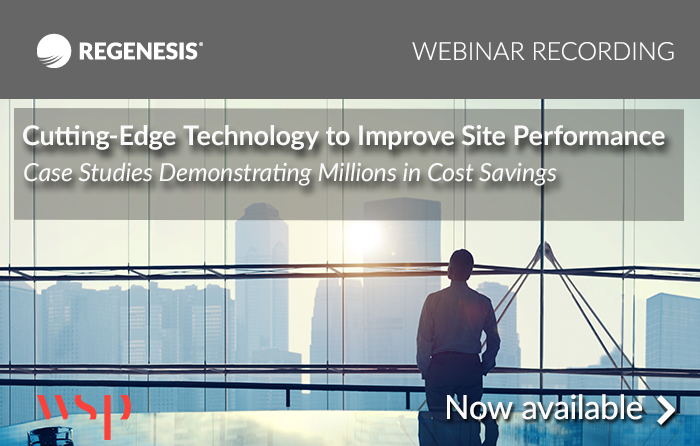In this webinar we are pleased to have as a special guest speaker Matt Burns, Technical Fellow and the U.S. Contaminated Land National Service Line Director for WSP. In this webinar he discusses project case studies where in situ remediation was chosen as an alternative compared to conventional liability management strategies due to significant cost-savings. Matt Burns is joined by Maureen Dooley, Director of Strategic Projects at REGENESIS.
Actionable molecular biological tools (MBT) data collection strategies and life-cycle cost comparisons between conventional and in situ technologies are presented for 2 sites. The sites that will be discussed include:
- A site with a large, oxic, dilute TCE plume with no apparent degradation products present. At this site, both cometabolic oxidation and abiotic reduction were assessed using qPCR, CSIA and magnetic susceptibility. Additionally, carbon-14 TCE assays were performed ex situ to quantify degradation rates along both pathways. Resultant degradation rate data was used to construct a four-dimensional reactive fate and transport model.
- A large chlorinated VOC plume in fractured sandstone where back diffusion is a confounding factor. At this site, a PlumeStop® plus bioremediation combined remedy pilot test was assessed using aquifer matrix in situ microcosms, deployed before amendment application, combined with qPCR and CSIA. The microcosm construct overcomes the sample collection constraints associated with analyte partitioning from the aqueous phase and allowed for the direct assessment of degradation occurring on the PlumeStop® activated carbon particle.
Deeper knowledge of contaminant degradation pathways and the analytical capability to demonstrate degradation along these pathways is fundamentally changing remediation approaches. Practitioners are moving away from conventional horsepower-based technologies toward in situ remedies. A key aspect of implementing successful in situ remedies is the use of MBTs to provide actionable data on treatment efficacy along highly site-specific degradation pathways. These data enable the cost to closure for in situ remedies to be better defined and compared to conventional liability management strategies.
Complete the form on this page to view this free webinar.
About the Presenters:
 Matt Burns
Technical Fellow | U.S. Contaminated Land National Service Line Director, WSP
Matt is a Technical Fellow and the U.S. Contaminated Land National Service Line Director for WSP with more than 25 years of professional chemistry and engineering experience. He is based Boston, Massachusetts and is responsible for the financial and technical depth and breadth of the contaminated land (site investigation and remediation) service line. Matt also brings chemical and microbial process expertise to assist local WSP teams with challenging investigation and remediation projects in the U.S. and across the globe. His area of expertise includes practical application of microbial and chemistry-based innovative remediation. He has authored numerous publications and conference platform presentations and is a frequent lecturer at continuing education workshops and webinars. Recently, he has been publishing and lecturing as part of the U.S. Environmental Protection Agency (EPA), National Groundwater Association (NGWA) and Northeast Waste Management Officials Association (NEWMOA) combined remedy initiative. Matt’s expertise in this area relates to stimulating multiple in situ degradation pathways with a single amendment application to more efficiently and cost effectively treat volatile organic compound-affected groundwater. Matt is on science advisory boards for non-profit educational and commercial entities. He is also on the editorial review board for the journal Remediation Journal. He holds a Bachelor of Science degree in Environmental Science from the University of Massachusetts at Amherst and a Master of Science degree in Civil/Environmental Engineering from the University of Maryland at College Park.
Matt Burns
Technical Fellow | U.S. Contaminated Land National Service Line Director, WSP
Matt is a Technical Fellow and the U.S. Contaminated Land National Service Line Director for WSP with more than 25 years of professional chemistry and engineering experience. He is based Boston, Massachusetts and is responsible for the financial and technical depth and breadth of the contaminated land (site investigation and remediation) service line. Matt also brings chemical and microbial process expertise to assist local WSP teams with challenging investigation and remediation projects in the U.S. and across the globe. His area of expertise includes practical application of microbial and chemistry-based innovative remediation. He has authored numerous publications and conference platform presentations and is a frequent lecturer at continuing education workshops and webinars. Recently, he has been publishing and lecturing as part of the U.S. Environmental Protection Agency (EPA), National Groundwater Association (NGWA) and Northeast Waste Management Officials Association (NEWMOA) combined remedy initiative. Matt’s expertise in this area relates to stimulating multiple in situ degradation pathways with a single amendment application to more efficiently and cost effectively treat volatile organic compound-affected groundwater. Matt is on science advisory boards for non-profit educational and commercial entities. He is also on the editorial review board for the journal Remediation Journal. He holds a Bachelor of Science degree in Environmental Science from the University of Massachusetts at Amherst and a Master of Science degree in Civil/Environmental Engineering from the University of Maryland at College Park.
 Maureen Dooley
Director of Strategic Projects, REGENESIS
Maureen Dooley has over twenty five years experience in the environmental industry including project management, research and development, senior technical oversight, remedial design and laboratory management. Ms. Dooley’s current position is the Director of Strategic Projects for REGENESIS. In her current role at REGENESIS, she provides technical leadership for complex soil and groundwater remediation projects throughout North America, as well as remediation design, strategy, and business development in the northeastern United States and eastern Canada. As part of her responsibilities at REGENESIS she has reviewed hundreds of potential projects and provided recommendations for remediation. In addition, she has completed numerous treatability studies designed to evaluate the remediation of a wide range of contaminants, including chlorinated solvents, petroleum hydrocarbons, and emerging contaminants like PFAS.
Maureen Dooley
Director of Strategic Projects, REGENESIS
Maureen Dooley has over twenty five years experience in the environmental industry including project management, research and development, senior technical oversight, remedial design and laboratory management. Ms. Dooley’s current position is the Director of Strategic Projects for REGENESIS. In her current role at REGENESIS, she provides technical leadership for complex soil and groundwater remediation projects throughout North America, as well as remediation design, strategy, and business development in the northeastern United States and eastern Canada. As part of her responsibilities at REGENESIS she has reviewed hundreds of potential projects and provided recommendations for remediation. In addition, she has completed numerous treatability studies designed to evaluate the remediation of a wide range of contaminants, including chlorinated solvents, petroleum hydrocarbons, and emerging contaminants like PFAS.

